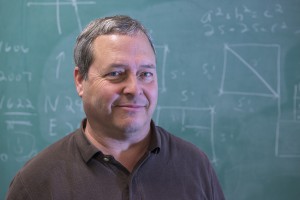 Take a look at a map of the world, and you’ll see that most of the boundary lines are solid. If you venture up to the Arctic regions, though, you will see dots. What seems like a subtle map feature to laymen has quite the storied history and an uncertain future. These are dots that Elizabethtown College Professor of Anthropology Robert Wheelersburg will help connect during his half-year Fulbright appointment to Iceland in the fall of 2015.
Take a look at a map of the world, and you’ll see that most of the boundary lines are solid. If you venture up to the Arctic regions, though, you will see dots. What seems like a subtle map feature to laymen has quite the storied history and an uncertain future. These are dots that Elizabethtown College Professor of Anthropology Robert Wheelersburg will help connect during his half-year Fulbright appointment to Iceland in the fall of 2015.
Just before Spring Break, as Wheelersburg was preparing for a research trip to Denmark, he received an invitation to serve as a Fulbright Scholar at the University of Iceland’s new Center for Arctic Policy Studies on a National Science Foundation (NSF) Arctic Research Grant. His proposal, “Arctic Sustainable Resources Policy in the North Atlantic: The Strategic View” details, complete with citations from various policy documents, the complicated and long history of the political, geographical and economic issues surrounding Arctic states—or those with an interest in the Arctic, even if they are not literally connected, and what that means to how natural resources are acquired and maintained in the region. Wheelersburg said in his proposal that he’ll explore sustainable economic development for the Arctic regions.
His research project intends to, as he writes in his proposal, “help inform policy makers during a difficult period when climate change is exposing new landmasses in the North Atlantic and the territorial lines establishing national boundaries begin to change from dotted lines to solid lines in the Arctic…” The “new landmasses” Wheelersburg mentioned are the changing physical landscape of the North Atlantic region. As ice melts or recedes, new land—unclaimed land—could appear. And the question remains: What happens to the natural resources found on these locations? In its call for proposals, the NSF stated it was looking for a variety of disciplines but strongly preferred those with an anthropology, archaeology, linguistics, public health or geology background. Wheelersburg explained in his proposal that Arctic cultural studies can provide a model for policy makers.
“Anthropology (ethnology) combined with an interdisciplinary perspective using geography and history can provide an understanding of how current claims of sovereignty by states and indigenous/traditional use rights evolved,” he wrote, adding that in his project he will reconstruct the historical and recent natural resource uses “by northern residents both in local communities and those outside the locations, for example, fishing.”
It’s changed my life and my family’s life too…”
A History Fulbright Fellowships
This appointment marks the third Fulbright fellowship for the anthropologist; he’s been to Sweden twice: first in 1985 and, again, in 1994. Nearly every year Wheelersburg, who, prior to academia, spent 10 years assigned to Iceland as an Army Reserves officer, has returned to Scandinavian countries on fellowships, for short-term faculty-student trips or for other academic research. In fact, this experience will “dovetail” nicely with an already-planned interdisciplinary, grant-funded trip to Iceland in spring 2016, in which Wheelersburg and fellow Iceland aficionado Matt Willen, associate professor of English, will take students to Iceland as part of an ethnography writing course based on the folklore of “magical landscapes” of the island country — think trolls and elves.
Wheelersburg is widely traveled, but many of his trips back to Iceland have been short. As a Fulbright scholar, he’ll spend a significant amount of time immersed in another culture.
“As anthropologists, we believe you actually have to spend time there,” he said, adding that this Iceland experience translates to his classroom, as well, including adding more first-hand knowledge to his Scandinavian studies course and, possibly, offer expertise in other courses that discuss policy development. But the Fulbright is not just about academic prestige to Wheelersburg.
“It’s changed my life and my family’s life too,” he said, adding that his wife joined him during his first appointment in Sweden—and as timing had it, his first son was born in the Nordic country. “My wife loves Sweden, and she still has friends there.” His wife and two sons joined him on his second appointment in Sweden.
Wheelersburg is one of two Elizabethtown College professors headed to Europe for a Fulbright fellowship. Christine Ciocirlan, associate professor of business, will spend the fall semester at Durham University in the United Kingdom researching environmental behaviors in organizations.
More reading about Arctic land claims: “Denmark and Greenland team up for continental shelf claim,” The Copenhagen Post, Dec. 15, 2014
About Wheelersburg: A graduate of Ohio State University with a doctorate from Brown University, Wheelersburg has been with Elizabethtown for 25 years. He is a specialist in Arctic and Scandinavian cultures and has conducted extensive fieldwork in Sweden, Iceland, Denmark and Russia
About the Centre for Arctic Policy Studies: The Centre for Arctic Policy Studies (CAPS), launched in March 2013, is a forum for interdisciplinary collaboration in the field of Arctic research with an emphasis on the role and policies of states and institutions, non-state and corporate actors, and broader aspects of governance, culture and society in the Arctic and High North.
Wheelersburg is one of two Elizabethtown College faculty members who will be abroad on a Fulbright fellowship in the fall; Cristina Ciocirlan, business, will be researching green workplace practices in the UK at Durham University School of Business.

